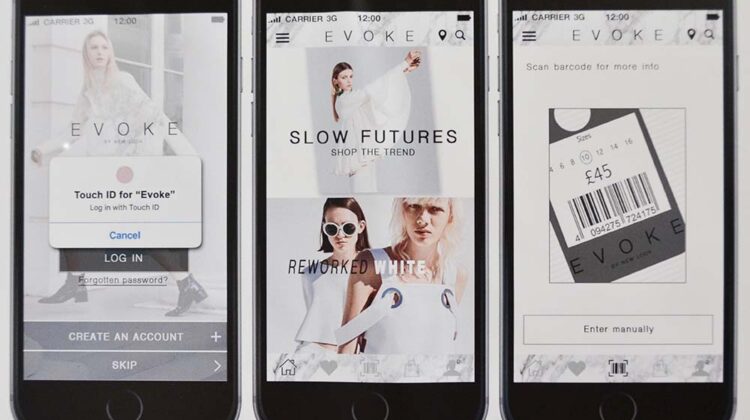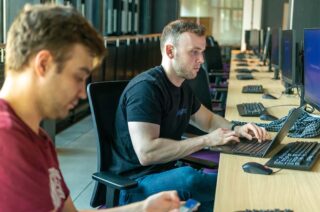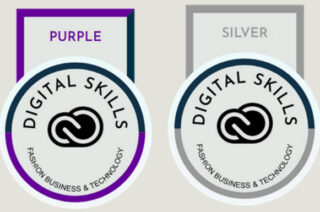Fashion, Business and Technology (FBT): Digital Story Tellers

E-learning spoke to Charlene Gallery, Lecturer in Digital Fashion Marketing Communications, to find out how Fashion, Business and Technology support their students to become digital story tellers.
Find out more below or download a pdf copy of the full case study.
Why was this project needed?
In the age of accelerating technological change, digital skills are fast becoming near-universal requirements for employment, particularly for highly-skilled positions.
- Over 80% of online jobs advertised highlighting ‘baseline’ digital skills as essential attributes.
- Graduates with digital skills earn an average wage differential of 29% over non-digital roles, yet whilst demand is high for graduates with digital skills, there is low supply.
- 68% of students lack understanding of which digital skills are required to start their careers.
Students, in effect, need to become adept digital storytellers, capable of shaping their own personal brand narratives and disseminating their unique professional narratives across multiple online platforms.
Integrating digital tools into the curriculum
As early adopters of digital technologies within Fashion, Business and Technology, we have radically reshaped the holistic curriculum through the integration of digital tools, resulting in an industry relevant, inclusive and collaborative learning environment.
Through our digital portfolio and graduate showcase projects, students can effectively shape their professional identities, individual points of views and unique value proposition externally to potential employers. The portfolio provides a mechanism to encourage student reflection, which has the potential to assist with students’ understanding of their own learning.
An online portfolio is an essential career toolkit which aids the student transition into industry. The portfolio project within Fashion Business & Technology supports students to;
- Investigate a specialist career pathway (employment, entrepreneurship, postgraduate study) most suitable to their individual and future aspirations.
- Critically assess, curate and appraise their work both independently and in collaboration with peers, academics and industry stakeholders.
- Use digital skills to assemble a public-facing portfolio which enhances their professional profiles.
- Demonstrate cultural and professional suitability for the targeted companies, thereby aiding the application and interview process.
- Become autonomous and self-confident.
- Formulate Communities of Practice and network.
- Become effective Lifelong learners, as the portfolio becomes a continual process, which can be refined throughout their career.
Moving to a digital degree showcase
The disruption caused by the 2020 pandemic was the catalyst for change within Fashion Business & Technology. Pre Covid-19, the traditional annual graduate show format involved printing and presenting students final projects on large scale poster boards. This format was already in need of updating and, although the university closure unfortunately halted the in-person celebration for students, it also provided an opportunity to embrace technology and digitalise the graduate show. Using technology, students were able to present their work to a much wider, more global audience.
As I already had extensive experience in developing online student portfolios at previous institution’s, I presented the idea of an online degree showcase to the Discipline Head of Education for FBT, who was fully supportive of the initiative. Joined by Aurelie Le Normand, the lead organiser of the degree show, we worked quickly to develop the platform, eliciting ‘buy in’ from the final year students and helped students to curate and digitalise static content using software such as Adobe Creative Cloud, Premier Pro, iMovie and Sketchup 3D, resulting in a highly interactive, online experience.
What did the project involve? How has it developed?
We originally developed two online platforms using issuu.com and wix.com, both of which have free use options, are highly intuitive and accessible.
- Issuu is a widely used online tool where users can upload a static document and convert it into an interactive flipbook, which can be published and shared digitally.
- wix.com is a user-friendly, web development platform.
Initially our students were apprehensive about developing their own websites, this nervousness was quickly dispelled once they realised, they didn’t need to learn how to code to create a site!
With our pilot portfolio project, each participating student had an individual page in the yearbook showcasing their diverse final outcomes. We embedded each page with a code, which hyperlinked to their own digital portfolio on the wix website. Each student was able to link their own URLs to personal professional sites such as LinkedIn, on CV’s and other, employer facing touchpoints.
As we moved closer towards a blended learning environment in 2021, the graduate show, lead by Aurelie Le Normand, evolved once again. FSE e-learning helped to develop a website using WordPress. The digital platform proved highly effective. Currently, we’ve chosen Wix as our preferred web platform for online portfolio projects as both staff and students find the platform accessible, simple and effective with ready-made templates that you can drag and drop content into.
View the 2021 showcase (click on individual student names within the site to view portfolio work).
Employer demand for online portfolios
As employability lead for FBT, I have noticed an upward trend on employers requesting online portfolios for second year placement candidates, in addition to final year students applying for graduate positions.
In response, we:
- Embedded the portfolio project into the second year optional units within FBT.
- Facilitated orientation and portfolio development sessions for both second and final year undergraduates.
How does FBT support student to develop their digital skills?
We recognise that the term “digital skills” covers a broad spectrum of competencies, skills and knowledge. Some students have greater digital skills and confidence than others when they begin their degree programmes.
Year 1:
We focus on equipping students with a solid foundation in digital skills typically used within the degree-related industries. We embed software packages such as Adobe Creative Cloud (Illustrator, Photoshop, InDesign etc) and Canva building skills in professional communication. Students are also introduced to professional data and analytics software such as Edited and learn how to extract and leverage data insights to inform their strategic decision making.
Years 2 and 3
We accelerate the students’ acquisition of advanced digital skills focusing on:
- Consumptive digital capabilities, (i.e., foundational tools and systems such as Excel, PowerPoint)
- Productive digital skills, (i.e., data and analytical reasoning, advanced CAD, UX Design, mobile development, 3D modelling, Artificial Intelligence, Extended Reality applications).
- The curricula focus on complex and collaborative problem solving, deep-learning and data-driven strategic thinking.
Students develop skills in:
- Search Engine Marketing (SEM), Search Engine Optimisation (SEO), Content Marketing.
- Develop digital brochures using Adobe/Canva to present research and communicate strategic thinking.
- Develop infographics to communicate complex concepts and data.
- Use a range of software to develop investor pitch decks and marketing campaigns.
What did your students think?
The reaction from students has been very positive. They enjoy seeing each other’s work and recognise and appreciate each student’s individuality and uniqueness. They feel more confident when applying for jobs, as they already have an online portfolio which showcases their skills.
“Initially I was nervous about developing a pitch deck as I did not have prior experience in video creation. However, it really helped develop my digital literacy and skillset which will be extremely useful post university, particularly as digital skills have become increasingly important due to the pandemic. The business project has enhanced my graduate profile and has been a key talking point for me at job interviews.”
Student testimonial
“This project has really shaped by career. Before this portfolio project, I didn’t feel as though I had a voice at university, now I have had the confidence to develop my own platform and networking initiative called Black in Fashion UK, which increases fashion career opportunities for minoritized and underrepresented students and creatives. I have used the digital skills gained during my degree to build a successful career within fashion marketing and brand development, my website has opened doors for me and I now work with sustainable fashion brand Stella McCartney to effectively develop social and inclusive initiatives and communications strategies, whilst also still managing my online social network”
Student testimonial
Impact in FSE
Through the digital portfolio project and subsequent graduate showcase platform, we observed the power of digital literacy, not only to enhance and evidence students’ employability skills, but to also enrich students’ learning experiences. When using digital tools, students actively engaged with their learning as it required them to fully dissect, assimilate and think critically. Digital should be embedded as way of communicating and should be fully integrated within the culture of Higher Education and beyond. The continued development of the digital literacy level of students is fundamental in enhancing the inclusivity, efficiency, and effectiveness of the learning environment, in addition to ensuring students are equipped to, not only enter the dynamically evolving labour market, but to also future proof their careers.


